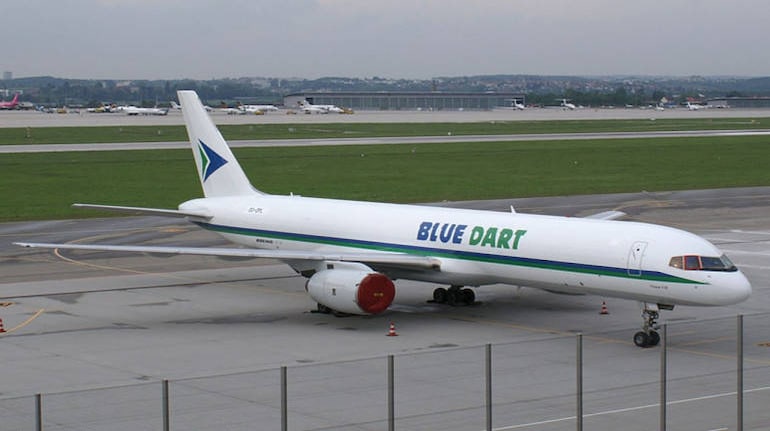



The COVID-19 pandemic has forced a surprising re-arrangement in the pecking order of India's largest air cargo carriers.
While SpiceJet did well to continue generating cash through its cargo arm SpiceXpress since late March, even as rest of the industry including IndiGo grounded its fleet after the nationwide lockdown, it is BlueDart Express that has come on top.
Data from the Directorate General of Civil Aviation (DGCA) show that the logistics major has clocked the highest volumes from April to June, latest for which the numbers are available.
Interestingly, SpiceJet has been aggressively promoting itself as India's number one cargo company since April. But the numbers say otherwise.
BlueDart had carried a total volume of 12,473 tons in June. SpiceJet, on the other hand, flew 9,816 tons and IndiGo did 7,875 tons. The numbers include schedule and non-scheduled operations, both in the domestic and international markets.
The logistics major, which has a fleet of six Boeing 757 freighters, claims to be among the leading courier and integrated express package distribution companies in South Asia.
Till March, IndiGo had continued to dominate the cargo segment, just like it does in the passenger business. It had ended 2019 with nearly 32 percent of the domestic cargo business. BlueDart finished just marginally ahead of SpiceJet. In fact, the Ajay Singh-lead airline had overtaken BlueDart in August 2019, but the logistics major managed to regain the lost ground and ended the year in the second position.
While BlueDart carried 1.22 lakh tons of cargo in 2019, SpiceJet flew 1.19 lakh tons. IndiGo, aided by a fleet that is the largest in the country, was much ahead with 2.28 lakh tons of cargo.
SpiceJet declined to comment. IndiGo didn't respond to queries.
What numbers tell
BlueDart though has disturbed the apple cart, unknowingly helped by the pandemic disruption.
Even as the rest of the airlines were forced to ground their fleet from late March onwards, when the government suspended domestic and international flights, BlueDart and SpiceJet got the permission to continue their cargo operations.
SpiceJet made the most of its unit SpiceXpress, which started operations in 2018. No other airline in the country has a separate cargo arm. All its peers, including IndiGo, carry cargo in the belly of their commercial aircraft.
As of August, SpiceJet's cargo division had a fleet of nine freighter aircraft consisting of five Boeing 737s, three Bombardier Q-400s and one Airbus A340. It had inducted the wide-body Airbus A340 cargo aircraft in August.
Even as the passenger business collapsed because of the lockdown, the cargo vertical came to SpiceJet's rescue, with telling impact. While IndiGo carried only 379 tons of cargo in April, SpiceXpress clocked a volume of 3,284 tons. It was the largest Indian cargo carrier in the international markets.
BlueDart got the highest volumes in April, with 3,842 tons.
SpiceJet's first quarter results reflect the impact of the cargo business. The cargo vertical reported a profit of Rs 482 crore, even as the mainstay passenger business incurred a loss of Rs 6,416 crore.
In the overall cargo industry though, its thunder was stolen by BlueDart. Aided by highest volumes for any player in the domestic market, the company recorded a total volume of 3,842 tons in April. SpiceJet carried 3,284 tons of cargo and IndiGo did just 379 tons.
The pecking order continued in May too. BlueDart led the industry with SpiceJet following on second and IndiGo in third. The country's largest airline had by then started carrying cargo in its passenger aircraft. IndiGo got on to the act as soon as domestic flights resumed, albeit with a cap in capacity utilisation, from May 25.
In June, the carrier clocked the second highest volumes when it comes to scheduled, domestic operations. SpiceJet was pushed to the third rank, even as BlueDart retained the top slot.
However, when one takes into account all the operations, including international and unscheduled ones, SpiceJet gets back to the second position, in place of IndiGo. That's thanks to SpiceJet's international cargo operations.
What did BlueDart do?
The logistics major operated close to 1,600 flight sector from April to mid-July, carrying over 21,000 tons of emergency supplies. These were part of the Ministry of Civil Aviation's Lifeline Udaan scheme.
"All through the pandemic and lockdown period, BlueDart has been flying its six Boeing 757- 200 freighters across major metropolitan cities in India to ensure uninterrupted supply chain," a representative from the company told Moneycontrol.
The executive added that the company also flew to international destinations, including Shanghai, Hong Kong and Yangone, carrying medical and pharmaceutical supplies.
"We have also been working closely with various state governments, local authorities and other institutions since the lockdown," the executive added.
Will BlueDart manage to hold on to its position as the country's largest cargo carrier?
Discover the latest Business News, Sensex, and Nifty updates. Obtain Personal Finance insights, tax queries, and expert opinions on Moneycontrol or download the Moneycontrol App to stay updated!
Find the best of Al News in one place, specially curated for you every weekend.
Stay on top of the latest tech trends and biggest startup news.